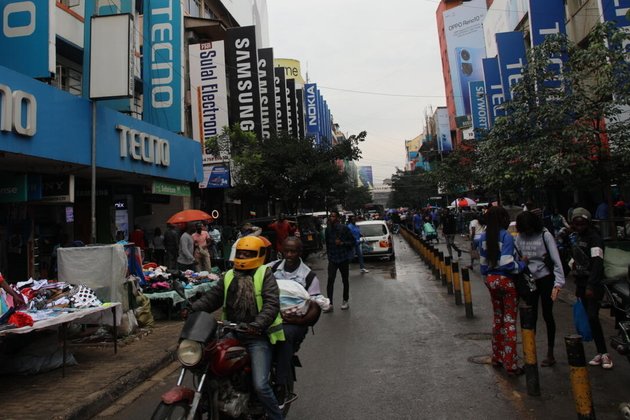

Kenya is grappling with a five-year streak of business closures linked to high taxes that critics blame on a government “borrowing spree” that most recently saw Nairobi awarded a $941 million loan from the International Monetary Fund.
Some 2,000 companies were struck off over the last financial year due to high operating costs and uncompetitive taxes, data from the Business Registration Service (BRS) shows. Others were forced to downsize in order to stay afloat.
In an effort to replenish the coffers of Kenya’s cash-strapped economy, President William Ruto last year revamped tax rules while at the same time introducing new levies.
Ruto was elected on the promise that he would reduce borrowing – and his overhaul of the tax system has been deeply unpopular among families and businesses struggling with the rising cost of basic goods.
Feeling the pinch
In the rural town of Githunguri, in Kenya’s central Kiambu County, former alcohol distributor Peter Mwaura moved into pig farming – saying excessive licencing fees, taxes and bribes had made his business unsustainable.
“I was working to pay taxes. Even with the little profit I got, some [police] officers wanted bribes so that I could operate beyond the stipulated time,” Mwaura told RFI.
“I decided to close the business and try pig farming. Even though the prices for feeds is high, it is generally better than the drinks business.”
In the capital Nairobi, meanwhile, electronics businesses are struggling to stay afloat amid the reduced demand and increased cost of goods.
Steve Omeri, a certified iPhone seller, was forced to shrink his stock after the prices of phones he was selling went up by 20 percent in less than a year on the back of hikes in import and excise duties.
“The number of phones we sell per day has drastically reduced … The prices are way too high,” Omeri told RFI. “I can’t stock as many devices as I used to.”
Economists warn that new taxes and levies may also drive away investors, especially as the Kenyan shilling hits new lows against the dollar and the euro – making the cost of doing business cheaper in neighbouring Tanzania and Rwanda.
Kenya eyes new year boost to tourism with visa-free systemTaxes ‘necessary’
Kenya’s government has continued to defend its new tax laws – the Finance Act of 2023 – arguing that everyone needs to pay taxes in order for the economy to grow.
Patrick Munene, MP for the Chuka Igambang’ombe constituency, in the east, told RFI that tax increases had actually seen even more businesses set up over the past year.
“Those who thought it was the government’s duty to cushion them by not paying taxes are the ones crying,” he said.
“Ignore the lies by people who say investors are running away from Kenya. The only thing the government should sort out is the high cost of electricity, which is affecting the manufacturing sector.”
International financial institutions such as the IMF and the World Bank, meanwhile, support the government’s taxation overhaul – despite widespread public protests last year when the rules were implemented.
EU, Kenya sign landmark trade deal hailed as beginning of ‘historic partnership’ Mixed reactions
Policy analyst Edwin Kegoli, with Nairobi’s Moi University, says the new tax strategy is helping to keep Kenya out of debt distress.
“The [$2 billion] Eurobond is maturing in June, and the new loan will help Kenya repay that debt,” Kegoli said.
“If you look at the agriculture sector, things are looking up. The subsidised fertiliser and farm inputs have helped farmers increase their harvest.
“Within a year Kenya will be exporting agricultural products and things will be back to normal.”
But other experts remain skeptical, warning that political leaders in Kenya often don’t follow through on their promises because they are rarely held accountable.
“President William Ruto promised to deal with corrupt leaders, lower the cost of living and reduce government borrowing when elected,” Nairobi-based economist Isaac Mutiso told RFI.
“As we speak today, he has received a loan of $941 million – money that will be eaten by corrupt fellows in his government as we battle the cost of living.”
24World Media does not take any responsibility of the information you see on this page. The content this page contains is from independent third-party content provider. If you have any concerns regarding the content, please free to write us here: contact@24worldmedia.com

A Brief Look at the History of Telematics and Vehicles

Tips for Helping Your Students Learn More Efficiently

How To Diagnose Common Diesel Engine Problems Like a Pro

4 Common Myths About Wildland Firefighting Debunked

Is It Possible To Modernize Off-Grid Living?

4 Advantages of Owning Your Own Dump Truck

5 Characteristics of Truth and Consequences in NM

How To Make Your Wedding More Accessible

Ensure Large-Format Printing Success With These Tips

4 Reasons To Consider an Artificial Lawn

The Importance of Industrial Bearings in Manufacturing

5 Tips for Getting Your First Product Out the Door